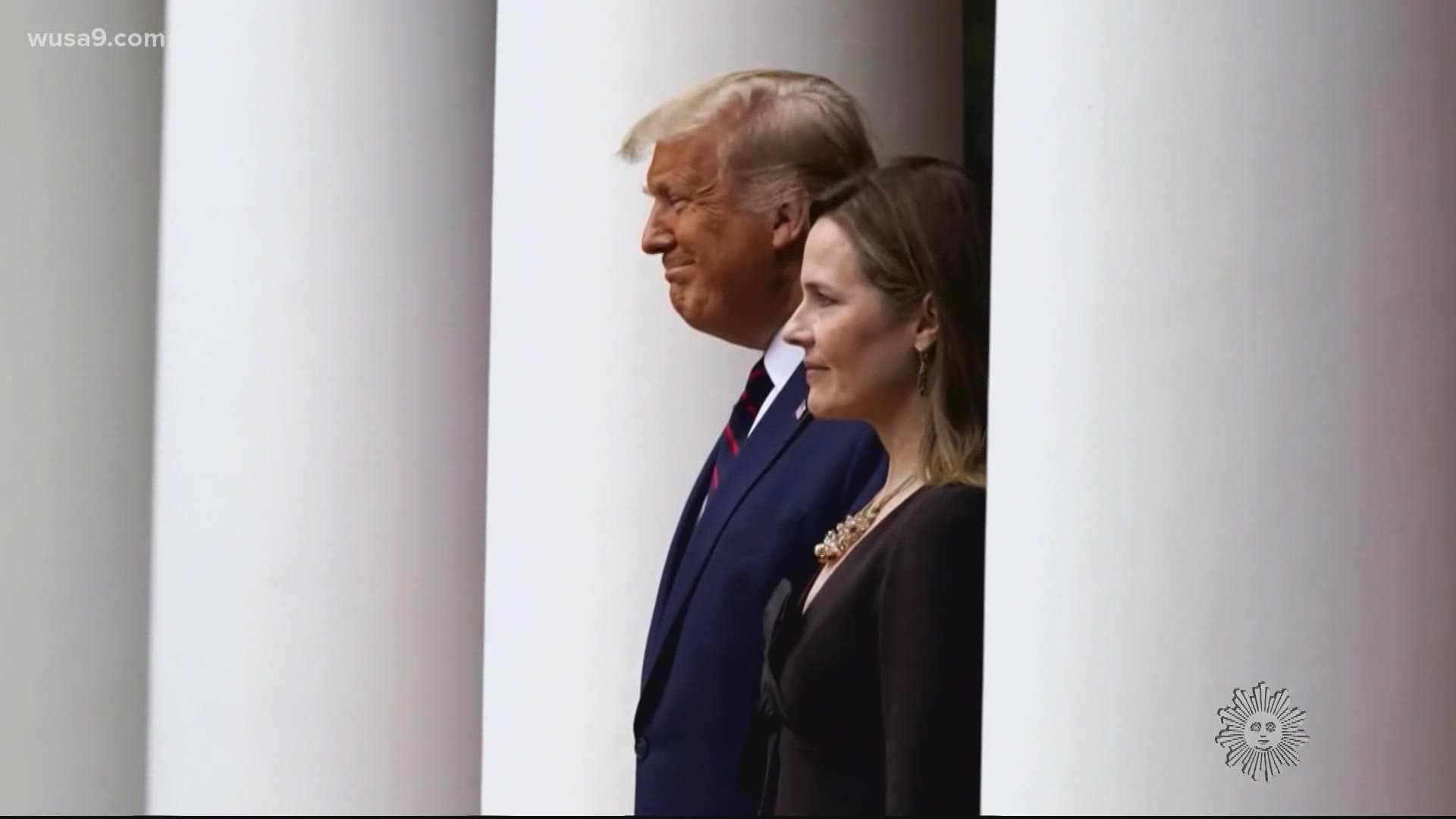WASHINGTON — Confirmation hearings will begin Monday morning for President Donald Trump’s Supreme Court nominee Amy Coney Barrett.
If confirmed, Barrett would fill the seat of Justice Ruth Bader Ginsburg who died last month.
The confirmation hearings come less than a month before the November 3 election. That has had Democrats urging the President and Senate not to proceed with the hearings, citing a similar situation in 2016 when Republicans then argued the American people should have a voice in which president selects the next Supreme Court Justice.
However, Republicans said this situation is different and GOP lawmakers argue it’s the President’s constitutional duty.
Barrett, a conservative, would shift the balance on the court significantly right. That has led Democrats to be concerned about the future of the Affordable Care Act. In a 2017 writing, Barrett criticized the ACA. The law will be back before the Supreme Court in November.
“But this is the moment unlike any other because this nominee comes before us with serious conflicts of interest,” Sen. Chuck Schumer (D-NY) Senate Minority Leader said. “And we're here today to say that given judge Barrett conflicts of interest, she should recuse herself from any decision involving the Affordable Care Act and its protections, and any decision related to the election that we will have on November 3rd."
Barrett, who would be the third justice on the court to be named by President Trump, released her opening statement Sunday. She will say that in every case she has ruled on in her three years as a federal judge, she has "done my utmost to reach the result required by the law, whatever my own preferences might be."
“And starting tomorrow, I think we're gonna have a full and a fair hearing, and it's gonna be an opportunity to consider Judge Barrett's qualifications,” Sen. Ted Cruz (R-TX) said. “I hope it doesn't go down the road it went last time. I hope we don't see Senate Democrats turning it into a political circus like they did with Justice Kavanaugh. I hope we don't see the kind of personal smears, smears directed at her family, directed at her faith.”
The confirmation hearings are expected to last four days and Republicans hope to approve her nomination out o the Senate Judiciary Committee on Oct. 22 so a full Senate vote could be done before Election Day.
EDUCATION:
Barrett was born in Louisiana and attended Rhodes College, a liberal arts school in Memphis, Tennessee, as an undergraduate. She went to law school in Indiana, at Notre Dame, on a full scholarship. She'd be the only justice on the current court not to have attended either Harvard or Yale for law school.
Barrett was a law professor at Notre Dame for 15 years before Trump nominated her to become a federal appeals court judge in 2017.
JUDICIAL PHILOSOPHY:
Barret has said that her judicial philosophy is the same as that of the late Justice Antonin Scalia, whom she worked for after law school and has called a mentor. Scalia described himself as an “originalist,” interpreting laws and the Constitution based on what they were understood to mean when they were written.
“Judges must apply the law as written," Barrett said when she spoke at the announcement of her nomination in the White House Rose Garden last month. "Judges are not policymakers."
RECORD:
Barrett's short tenure as a judge on the 7th U.S. Circuit Court of Appeals has led to few noteworthy or controversial opinions. She has, however, signed onto several decisions that she is sure to be questioned about during her confirmation hearing.
In 2018, a three-judge panel ruled that Indiana laws requiring that funerals be held for fetal remains after an abortion or miscarriage and banning abortions because of the sex, race or developmental disability of a fetus were unconstitutional.
Barrett was among four judges who wanted the full court to weigh in and suggested that the laws might be constitutional. And last year, after a three-judge panel blocked an Indiana law that would make it harder for a minor to have an abortion without her parents being notified, Barrett voted to have the case reheard by the full court.
In a dissent in a 2019 gun-rights case, Barrett argued that a conviction for a nonviolent felony shouldn’t automatically disqualify someone from owning a gun. Also in 2019 Barrett wrote a unanimous three-judge panel decision making it easier for men alleged to have committed sexual assaults on campus to challenge the proceedings against them.
FAITH:
Barrett would be the seventh member of the court either to be Catholic or have been raised Catholic. But she's been somewhat more vocal about her faith than other members, and faith became a flashpoint during her confirmation to be an appeals court judge.
At Notre Dame, a Catholic university, Barrett was a member of University Faculty for Life. And in 2006 she signed her name to a newspaper ad sponsored by an anti-abortion group in which she said she opposed “abortion on demand” and defended “the right to life from fertilization to the end of natural life.” Barrett’s membership in a Christian group called People of Praise has also drawn scrutiny, as has a law review article she co-authored decades ago that concluded that Catholic judges are “morally precluded from enforcing the death penalty.”
At Barrett's 2017 confirmation hearing, Democrats questioned whether her personal views would color her legal judgment, especially with respect to the landmark 1973 Roe v. Wade decision legalizing abortion. Sen. Dianne Feinstein, D-Calif., at one point told Barrett she was concerned “that the dogma lives loudly within you.” That remark prompted an outcry from Catholic leaders.
FAMILY:
Barrett has joked that the president asked her to be the ninth justice and that she's used to being in a group of nine: her family.
“While I am a judge I’m better known back home as a room parent, carpool driver and birthday party planner,” Barrett said in September.
Barrett and her husband, Jesse, a lawyer, are the parents of seven children: Emma, Vivian, Tess, John Peter, Liam, Juliet, and Benjamin. Vivian and John Peter are adopted and were born in Haiti. And Benjamin, their youngest child, has Down syndrome. Barrett has said that Benjamin's “brothers and sisters unreservedly identify him as their favorite sibling.”



